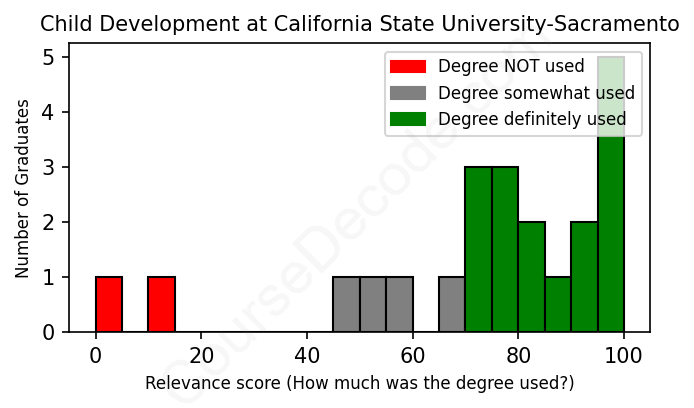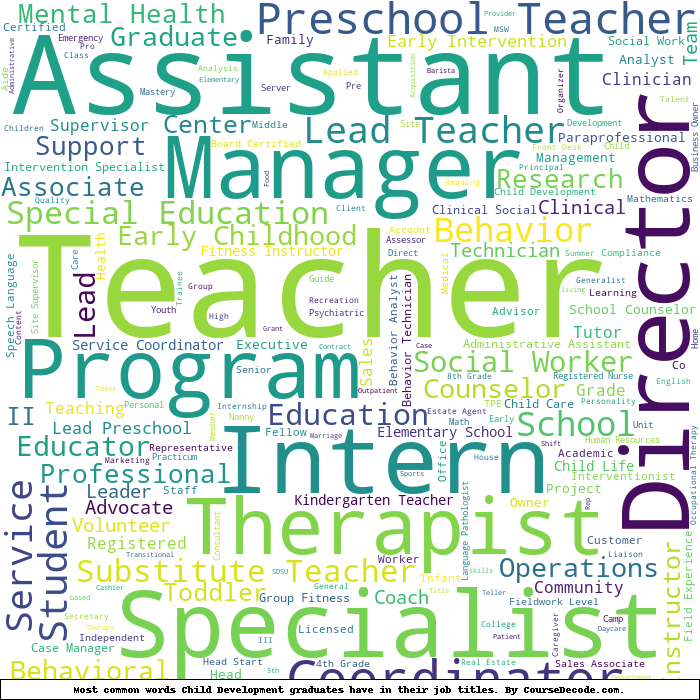
First, some facts. Of the Child Development graduates from California State University-Sacramento we've analyzed , here's how many have used (or NOT used) their degree in their career:

These are estimates based on AI analysis of 22 LinkedIn profiles (see below).
The verdict? Above average. Overall, with an average relevance score of 73%, Child Development graduates from California State University-Sacramento have a higher likelihood (+6%) of finding work in this field compared to the average graduate across all fields:
And for comparison, here's the chart for all profiles we've looked at across all degrees.
Also, after graduating, 40% of these graduates have pursued further education other than another Bachelor's degree (such as a Masters degree or other), compared to the average across all profiles of 35%. This suggests you may need more than just a Bachelors degree to be competitive as a Child Development graduate.
See the details:
|
Relevance score: 74% We think this person has gone into a career highly relevant to their degree. We think this person has gone into a career highly relevant to their degree.
DEGREE INFOGraduated in 2011 from California State University-Sacramento with a bachelor's of child development in Child Development. No other secondary education since. JOB HISTORY SINCE GRADUATIONSpecial Education Instructional Assistant Roseville City School Districts Aug 2018 - Aug 2021 Program Technician II  State of California Apr 2021 - Sep 2022 Staff Services Analyst  State of California Sep 2022 - Jan 2024 Associate Governmental Program Analyst  State of California Feb 2024 - Present ABOUTExperienced Program Coordinator with a demonstrated history of working in the education management industry. Strong community and social services professional skilled in Microsoft Word, Curriculum Development, Public Speaking, Microsoft Excel, and Customer Service. |
The top 10 most common jobs done by the graduates we've analyzed (ranked most common to least) are:
So, if we take a look at the career paths of folks who graduated with a degree in Child Development from California State University-Sacramento, we can see some noticeable trends. The most common types of jobs these graduates have landed are in educational settings, especially as teachers, speech language specialists, and special education instructors. Many of them work directly with children in roles that require a deep understanding of child development theories and practices, which makes sense since they're applying what they studied in school. Positions like preschool teachers, behavioral therapists, and program coordinators at child development centers are also pretty popular. These roles heavily rely on the knowledge acquired during their degree, which is awesome because it shows a clear connection between their education and their jobs.
That said, not every job these graduates took is closely related to child development. For example, you’ll find some individuals in administrative or support roles like project managers and data analysts, which don’t necessarily require that specialized child development knowledge on a daily basis. Some even ventured into completely unrelated fields like real estate or retail, where child development training won’t be using that expertise at all. Overall, while many graduates are successfully working in relevant positions that make the most of their degree, there's a significant chunk exploring various career avenues that don’t directly relate to the field. It's a mixed bag, but the strong presence of education-related roles shows that there's definitely good demand for Child Development graduates in areas where their knowledge is essential.
Here is a visual representation of the most common words in job titles for Child Development graduates (this is across all Child Development graduates we've analyzed, not just those who went to California State University-Sacramento):

Graduates from the Child Development program at California State University-Sacramento generally start their careers in roles that are directly related to education and child support, especially right after graduation. Many land their first jobs as teachers, teaching assistants, or in various supportive roles like speech language specialists or behavior therapists. This initial foray into the workforce often helps them build foundational experience and skills in working with children, which is crucial in this field. For instance, we see individuals taking on teaching positions, working with special education, or even becoming program assistants right out of school.
As these graduates progress in their careers, about five to ten years later, many continue advancing within the field of education or child services, often moving into leadership or specialized roles. We observe a good number of them becoming program directors, special education coordinators, or behavior analysts, which indicates that they are building meaningful careers related to child development. However, there are also instances of graduates taking roles that seem less aligned with their degree, like moving into administrative positions or even leaving the education sector altogether. Overall, while many of these graduates find fulfilling careers connected to their studies, there is a mix of success stories alongside those who may not directly relate their work to child development as they ten years down the line.
The Bachelor’s degree in Child Development at California State University-Sacramento is pretty manageable compared to some other majors, but it definitely has its challenges! You'll dig into topics like child psychology, early education practices, and even some research methods, which can get a bit heavy. If you’re really passionate about working with kids and eager to learn about their development stages, you’ll probably find the coursework interesting and rewarding. There are also some hands-on experiences and projects involved, which can make it fun, but it does require a solid amount of reading and writing. So, if you're organized and ready to engage, you should do just fine! It’s not a cakewalk, but it’s not unbearably tough either.
Most commonly, in the LinkedIn profiles we've looked at, it takes people 2 years to finish a Bachelor degree in Child Development.
It looks like the graduates from California State University-Sacramento have had a pretty mixed bag when it comes to making decent money. Many of them started in entry-level roles in education or support services, like teacher assistants and intern positions, which typically won’t pay a ton, especially in the beginning. However, some of them have moved up to more senior roles, like program analysts or special education directors, which generally offer better salaries. Still, jobs in child development and education often come with budget constraints, so while some may be making a comfortable living now, others are likely still working their way up the ladder and may not see their income reflect all their hard work just yet. Overall, it seems like they have potential for better pay, but the path can be a grind!
Here is a visual representation of the most common words seen in the "about" section of LinkedIn profiles who have a Bachelor degree in Child Development (this is across all Child Development graduates we've analyzed, not just those who went to California State University-Sacramento). This may or may not be useful:

Here are all colleges offering a Bachelor degree in Child Development (ordered by the average relevance score of their Child Development graduates, best to worst) where we have analyzed at least 10 of their graduates:
| College | Score | Count |
|---|---|---|
 California Polytechnic State University-San Luis Obispo California Polytechnic State University-San Luis Obispo
|
83 | 10 |
 San Jose State University San Jose State University
|
80 | 10 |
 California State University, Fullerton California State University, Fullerton
|
79 | 12 |
 California State University, Northridge California State University, Northridge
|
77 | 11 |
 California State University-Sacramento California State University-Sacramento
|
73 | 22 |